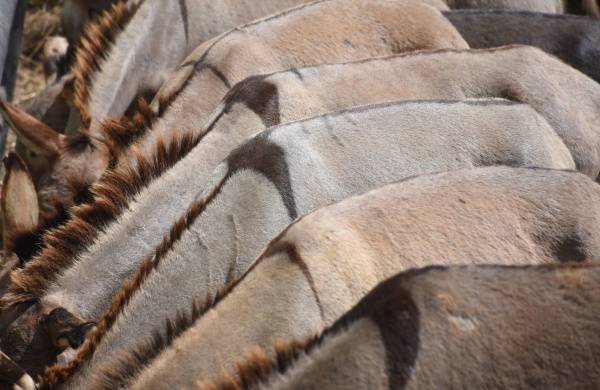
African Heads of State have agreed a landmark moratorium on the donkey skin trade. The agreement was reached on February 18 during the 37th African Union Summit in Ethiopia.
Over the last decade, Africa has seen its donkey population decimated due to Chinese demand for ejiao, a gelatine used in traditional Chinese medicine that is made from boiling down donkey skins. Believed to have unsubstantiated health benefits, demand for ejiao has obliterated China’s own donkey population, leading to huge export industries in Africa and South America.
The milestone agreement will help protect the continent’s 33 million donkeys from being stolen, trafficked and slaughtered, and will also safeguard tens of thousands of communities across Africa that rely on donkeys for their wellbeing and livelihoods.
In November 2022, donkey welfare organization Brooke was secretariat of the Pan African Donkey Conference in Tanzania, where ministers signed the historic Dar es Salaam declaration that kick started Union discussions to ban the trade.
The outcome of the Summit also follows publication of figures from The Donkey Sanctuary which show that globally at least 5.9 million donkeys are slaughtered for their skins every year to meet demand from China. The figure represents The Donkey Sanctuary’s most conservative estimate and is projected to reach 6.7 million by 2027.
Dr Calvin Solomon Onyango, Director of The Donkey Sanctuary in Kenya, said: “Here in Kenya we see first-hand the devastating impact of the donkey skin trade. Not just the horrific treatment of these gentle animals, but also the effect it has on women, children and the communities who rely on donkeys for their social and economic lives.
"Based on what we have seen here in Kenya, if the exploitation of donkeys were to continue at the rate we had been seeing, in another three to six years, donkeys could be joining rhino and elephants as an endangered species in Africa.”
In Brazil, where donkeys are also trafficked and killed for their skins, legislation to ban the slaughter of all equines is expected to pass the National Congress in 2024.
Investigations by The Donkey Sanctuary have shown that trade and shipping channels used by skin traders are exploited by criminals engaged in wildlife, arms and drug trafficking and other illegal activities such as money laundering, passport fraud and corruption. The goods are distributed using established shipping channels using vague and misleading labelling to avoid detection.
Additionally, the transportation of untreated skins and improper disposal of donkey carcasses risks the spread of infectious diseases such as anthrax. Carcasses or hides are known to be a particular risk for transmission of anthrax, and there is a risk of exposure to those who have access to bodies and body parts such as shipping workers or abattoir workers.
“This trade in potentially hazardous materials, shipped between countries often via indirect routes with limited or, at times, no visibility of country of origin or disease status of animals, has serious implications for the global shipping industry,” reports The Donkey Sanctuary in its 2022 report The Global Trade in Donkey Skins: A Ticking Time Bomb.
The report recommends that the shipping industry should:
1. Refuse to carry consignments of donkey skins.
2. Introduce a specific HS code for consignments of donkey skins instead of using a generic code that is also used for consignments of bovine and other skins.
3. Mandate the use of risk assessments and suitable mitigation to account for potentially infectious clinical waste material.
4. Raise awareness among the industry about the potential health risks associated with hazardous animal-derived skins.



